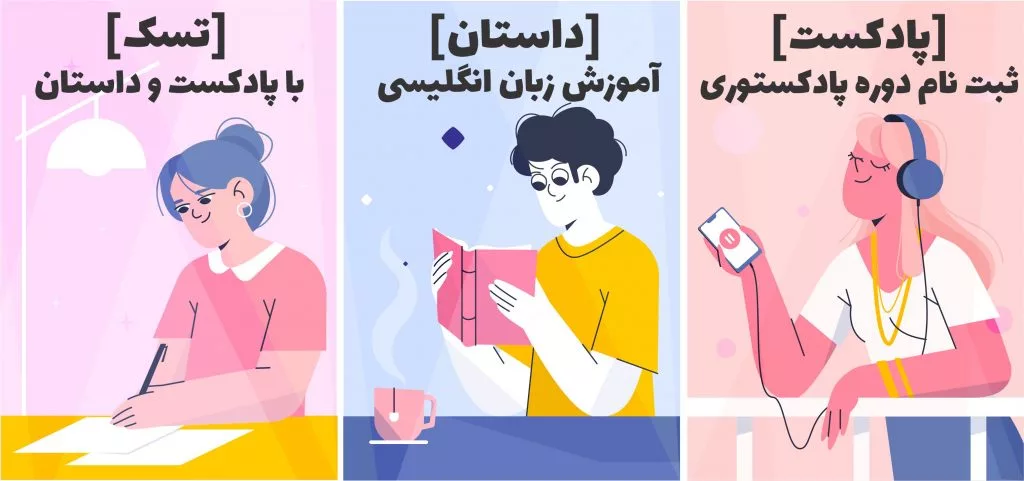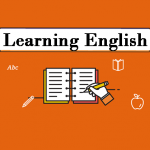پادکست انگلیسی BBC – یادگیری زبان جدید
در این قسمت درباره یادگیری زبان جدید صحبت میشه. بسیاری از محققان بر این باورند که دانش به یک زبان دیگر باعث تقویت قدرت مغز شما خواهد شد. بنابراین منتظر چه چیزی باید بمانیم از همین الان شروع کنید. رسیدن به دانش یک زبان دیگر نیازمند یک سری مهارتها و روشهایی هست که در این برنامه درباره آن بحث خواهد شد. (نظر خودتون رو به انگلیسی در بخش دیدگاه با ما در میون بذارید!) در پادکست انگلیسی BBC – یادگیری زبان جدید میشنویم که راب ونیل درباره این مسایل صحبت می کنند و در طول مسیر هم کلمات مرتبط رو آموزش میدن.
سوال پادکست انگلیسی BBC – یادگیری زبان جدید :
Approximately how many languages there are in the world altogether? Are there…
a) 70
b) 700
c) 7,000
به پادکست خوب گوش کن تا جواب رو پیدا کنی.
اگر می خوای گوش دادن به پادکست تا حد امکان برات ساده و کارآمد باشه مراحل زیر را دنبال کن:
هر روز به پادکست گوش کن. وقتی براش یه وقت ثابت در روز در نظر بگیری برات تبدیل به عادت میشه و این عادت هرروز پیشرفت میکنه.
پادکستی رو پیدا کن که موضوعش برات جالب باشه. وقتی از خود موضوع لذت ببری یادگیری هم برات لذتبخش میشه.
به پادکستی گوش کن که transcript یا متن داره. این بهت کمک می کنه تا کلمات و عبارات جدید رو به سرعت در متن پیدا کنی و ساختار انواع مختلف جمله رو خوب یاد بگیری.
پس از گوش دادن به پادکست با متن، در مرحله بعدی سعی کن بدون نگاه کردن به متن این کار رو انجام بدی. این کار مهارت شنیداری رو تقویت می کنه و کمک می کنه تا انگلیسی زبانان بومی را راحت تر درک کنی، حتی اگر خیلی سریع صحبت کنن.
اگه به پادکست انگلیسی گوش کردی و نتونستی کامل متوجه اش بشی، ناامید نشو. پادکست هایESL -English as Second Language بیشماری وجود دارن که برای سطوح مختلف، از ابتدایی تا پیشرفته طراحی شدن. مطمئنا هر روز می تونین یه پادکست مناسب با سطح خودت پیدا کنی.
فراموش نکن که هرچی بیشتر تمرین کنی در اون مهارت رشد میکنی! به قول انگلیسی ها: Practice makes perfect
پادکست انگلیسی BBC - یادگیری زبان جدید
| معنی به فارسی | معنی به انگلیسی | واژه |
| کامل یا خوب یادگرفته | learn thoroughly or learn well | master |
| روان، سلیس | speak well and without difficulty. | fluent |
| تکرار یک اتفاق هر چند وقت یکبا | how often something occurs | frequency |
| صرف فعل | changes to the basic form of words to show changes to the way they are used in a sentence | inflections |
| ساده ترین شکل یا پایه اصلی یک کلمه | the simplest form or base form of a word | lemma |
BBC 6 minute English - How do you learn to speak a language
Transcript of the podcast

Rob
Hello and welcome to 6 Minute English– the show that brings you an interesting topic, authentic listening practice and vocabulary to help you improve your language skills. I'm Rob…
Neil
Watashi no namae wa Neil desu. And that means 'my name's Neil'.
Rob
So Neil, here's a question for you – can you speak any languages other than English of course? I think you can!
Neil
Un poco de español that means a little bit of Spanish. Some Japanese, which I tried at the beginning and also a bit of Czech language - Dobrý den, jak se máš?
Rob
Very impressive. So what tips can you give for learning to speak another language?
Neil
Well, practise, practise, practise – and don't be afraid of making mistakes as I no doubt have.
Rob
Of course. Well my aim this year is to master the Spanish language. Master means to learn thoroughly.
Neil
Muy bien! Well you're not alone. A survey by the British Council found learning a language is a new year's resolution for about one in five Britons in 2018. So learning Spanish is a good start Rob but do you know approximately how many languages there are in the world altogether? Are there…
a) 70
b) 700
c) 7,000
Rob
Well I know there are many but surely not 7,000 so I'm going to say b) 700 – but don't expect me to learn all of them.
Neil
I won't Rob. But I will give you the answer later. So, we all know learning another language is a good thing – it brings us many benefits.
Rob
Yes, we can communicate with people from other countries and when we're travelling we can understand what signs and notices say. So we don't get lost.
Neil
That's right – but many scientists also believe that knowledge of another language can boost your brainpower. A study of monolingual and bilingual speakers suggests speaking two languages can help slow down the brain's decline with age.
Rob
All good reasons. But Neil, learning another language is hard. It would take me years and years to become fluent in say, Mandarin – by fluent I mean speak very well, without difficulty.
Neil
Well this depends on your mother tongue. In general, the closer the second language is to the learner's native tongue and culture in terms of vocabulary, sounds or sentence structure - the easier it will be to learn.
Rob
But whatever the language, there is so much vocabulary to learn – you know, thousands and thousands of words.
Neil
Maybe not Rob. Professor Stuart Webb, a linguist from the University of Western Ontario, may be able to help you. He spoke to BBC Radio 4's More or Less programme and explained that you don't need to do that…
Professor Stuart Webb, linguist, University of Western Ontario
For language learners in a foreign language setting – so for example if you were learning French in Britain or English in Japan, students may often really struggle to learn more than 2,000, 3,000 words after many years of study. So for example, there was study in Taiwan recently that showed that after nine years of study about half of the students had still failed to learn the most frequent 1,000 words. Now they knew lower frequency words but they hadn't mastered those most important words.
Neil
So Rob, don't waste your time trying to learn every single word. Professor Webb spoke there about research that showed students knew lower frequency words but weren't learning enough high frequency words.
Rob
Right, and frequency here means the number of times something happens – so the important words to learn are the high frequency ones – and how many are there exactly?
Neil
Here's Professor Stuart Webb again…
Professor Stuart Webb, linguist, University of Western Ontario
For example, with English, I would suggest if you learn the 800 most frequent lemmas – which is a word and its inflections – that will account for about 75 per cent of all of the English language. So that learning those 800 words first will provide the foundation for which you may be able to learn the lower frequency words.
Rob
Fascinating stuff. And good to know I just need to learn about 800 words – or what he calls lemmas.
Neil
Yes a lemma is the simplest form or base form of a word. And the inflection here refers to how the base word is changed according to its use in a sentence. Knowing these things give you a foundation – the basics from which you language learning will develop. Simple
Rob
Thank goodness I am learning just one new language!
Neil
But how many languages could you potentially be learning Rob? Earlier I asked you, approximately how many languages there are in the world altogether? Are there…
a) 70
b) 700
c) 7,000
Rob
And I said 700. Was I right?
Neil
No Rob, you were wrong. There are around 7,000 recognised languages in the world but UNESCO has identified 2,500 languages which it claims are at risk of extinction.
Rob
A sobering thought Neil. Now shall we remind ourselves of some of the English vocabulary we've heard today. Starting with master.
Neil
To master a new skill, in this context, means to learn thoroughly or learn well. "Rob hopes to master Spanish before he starts a new job in Madrid."
Rob
That's news to me Neil! But it would be good to be fluent in Spanish – or any language – or to speak it fluently – that's speaking it well and without difficulty.
Neil
Now our next word was frequency. Here we are referring to high and low frequency words – so it means how often they occur. Examples of a high frequency word are 'it', 'the' and 'and'.
Rob
And our next word is inflections. These are the changes to the basic form of words according to their function in a sentence. Such as adding an 's' to the end of a word to make it plural.
Neil
And don't forget lemma which is the simplest form or base form of a word before an inflection is added.
Rob
And finally foundation which means the basics your learning grows from.
Neil
That just leaves me to remind you that you can learn English with us at bbclearningenglish.com. That's it for today's 6 Minute English. We hope you enjoyed it. Bye for now. Na shledanou. Hasta luego. Ja-ne.
Rob
And in English, goodbye.
Neil
Goodbye.
امیدوارم ازپادکست انگلیسی BBC - یادگیری زبان جدید لذت برده باشید.
گوش دادن به پادکست روش خوبی برای تقویت مهارت شنیداری و هم چنین یادگرفتن کلمات در بستر یک موضوع خاصه که این به تقویت مهارت مکالمه انگلیسی نیز کمک زیادی می کنه.
اگه تو هم از اون آدمهایی هستی که از گوش دادن به پادکست لذت می بره برات یه خبر خوب دارم! آموزشگاه آموزش زبان انگلیسی 24talk یه دوره طراحی کرده مبتنی بر پادکست و داستان کوتاه به اسم "پادکستوری - Podcastory". این دوره سعی کرده یادگیری زبان انگلیسی رو مناسب با نیاز و سطح زبان آموز به یه فرایند بسیار مفرح، موثر، سریع و کم هزینه تبدیل کنه.
همین الان می تونی با کلیک روی عکس زیر و ثبت نام در دوره ی آموزش زبان انگلیسی با پادکست و داستان ۲۴talk اولین و مهم ترین قدم رو برای یادگیری زبان انگلیسی برداری. وقت رو از دست نده!












